Avatar: The Last Airbender, Nick’s wushu cartoon smash success, was a story of pre-teens aimed at teenagers. Or maybe it was a story aimed at pre-teens coaching them on what to expect when they became teenagers. Either way, the lessons – about infatuation, about hard work, about losing one’s innocence – are lessons that benefit teenagers the most.
The follow-up, Legend of Korra, takes place seventy years later. It features an older protagonist – Korra, a bold and impulsive teenager – and is set in a bustling modern city. If TLA is a story of pre-teens aimed at teenagers, LOK is a story of teenagers aimed at adults. Or maybe it’s targeting teenagers, but it’s telling them what to expect in adulthood. Or maybe it’s meant for adults who have lost their way.
Whatever the case, the lessons that Korra learns are lessons that adolescents should recognize. Let’s explore.
Living Up To Your Potential Is Scary
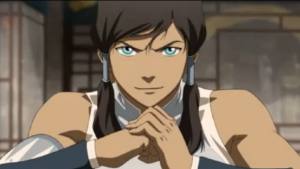
TLA begins with Aang avoiding his destiny as the Avatar. He froze himself beneath a glacier because he didn’t want to begin Avatar training and leave behind his childhood. S1 (and much of the later seasons) deals with Aang realizing that he can’t keep from becoming the Avatar – from growing up – while the world falls apart.
LOK has no such obstacles. We first meet Korra as a precocious four-year-old, flinging stone blocks and fireballs. “I’m the Avatar!” she yells. “You gotta deal with it!” She’s a clear contrast with Aang’s reluctance. She knows she’s the Avatar and she’s ready to claim the title.
Once she reaches Republic City, however, she learns that being the Avatar isn’t all it’s cracked up to be. It’s not enough to merely be an exceptional bender, if she causes as much damage as she prevents (like when apprehending a petty gang in E1). She has to be a representative to common people. She has to rely on official channels, such as the Council and the police, while also fighting corruption within those channels, such as Councilman Tarrlok and Chief Bei Fong’s replacement.
On top of all that, she has to deal with Amon. Amon is a uniquely terrifying villain, for reasons I’ll elaborate on below. He shows up without warning, always traveling with an armed and capable entourage. He’s an adversary of such power that only the Avatar can stand against him. Unfortunately, neither Korra nor anyone else know how to handle Amon.
Despite these challenges, the pressure does not let up on Korra. People keep asking things of her: Republic City’s yellow press, the Council, the common citizenry. She has to learn airbending, the elemental form to which she’s least suited – and lest you think Korra should just suck this up, recall that no one besides the Avatar ever has to learn a form to which they’re unsuited. Waterbenders are born waterbenders, and they’re discovered as waterbenders when they show an affinity for waterbending. It’s only the Avatar who has to train against type, and that’s in addition to learning how to talk to spirits, enter the Avatar state, and chi-bend.
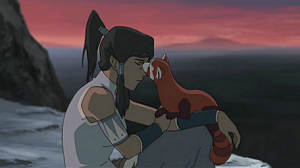
Korra discovers that having to live up to what people expect of you can be scary. It’s great to hear from adults and peers how amazing you are – how smart, how fit, how great at firebending. And being encouraged as a child is certainly healthier than being discouraged or belittled. But if you spend your whole childhood basking in the enthusiastic approval of authority figures, what happens when those authority figures turn to you for help? What happens when you have to deliver on a lifetime’s worth of expectations?
Korra’s desire to live up to what’s expected of the Avatar leads her to make some dangerous choices. She challenges Amon to a one-on-one duel. She joins a pro-bending league, putting her abilities to a public test. She confronts the most powerful member of the Council after he arrests her friends. This is more than would be expected of any bender – but it’s fully appropriate for the Avatar.
And Korra also gets scared. She never backs down from the challenges of her role as Avatar, but she grapples with a lot of private fears. Only her closest friends see the extent of her doubts. Korra deals with the challenge that all gifted children have to face – the world expects a lot of you. And if you’re not certain of what you’re supposed to do with your life – and no adolescent is certain – then that pressure to live up to the world’s expectations can either rush you into hasty decisions or overwhelm you with terror.
Dying Isn’t As Scary As Losing What Makes You Unique
The world of TLA is very pre-modern: steam power, written communications, swords and bows and boomerangs. People work very hard to subsist as farmers or laborers, with the world’s one mega-city, Ba Sing Se, being something of a novelty. They’re preoccupied with survival and freedom, as often happens in a world at war.
By contrast, the world of LOK is very modern: air and rail travel, wireless radio, shock gloves and mecha tanks. People are in less danger of dying or being sent to a labor camp. As happens during times of peace, attention turns inward. The great fear in peacetime is no longer dying or deprivation, but losing one’s humanity.
(This is also partly a function of having just survived a war. Consider the existentialist literature that followed WW1, or the restless Beat era that followed WW2, or the punk era that followed Vietnam. When we survive the destruction of war, we don’t worry about destruction; we worry about our souls)
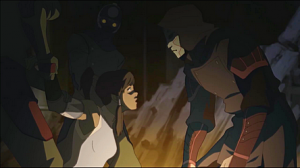
Into this bustling modern society comes the radical Amon. While Republic City is full of peace and optimism, there are enough disenfranchised people that Amon can find an audience. He speaks of upsetting the existing power structure through violent revolution, which is one of the harder sales to make. And he wields a unique and terrible power: the ability to take someone’s bending away.
As a narrative device, this is genius. It imparts the seriousness of an adult drama into a children’s cartoon. If Amon dragged benders onstage and executed them one at a time at gunpoint – a Republic City Che Guevara, if you will – it would never make it past Nick’s standards and practices department. Instead, he just undoes their bending. That’s all! See? They’re still alive. Perfectly safe for children.
Think about this a little longer, though, and you understand how terrible a fate this is. Benders get the power of bending through birth. They then spend years grinding that raw potential into a useful skill. Every bender enters into a social role that hinges on their bending talent. Nobody bends casually; nobody’s a radio correspondent who just happens to be an earthbender. If you can earthbend, then you probably work in construction, or architecture, or you compete as a pro-bender, or you shake down shopkeepers with a criminal triad.
Bending is your life. It’s a sixth sense you were born with, it’s a discipline you’ve spent decades honing, and it’s how you contribute to the social order. It’s how you identify to yourself and to others. And then, with very little fanfare, a masked stranger takes it away from you. All done.
We can’t be so callous as to say dying would be preferable to such a fate. But you can’t imagine the survivors of a bending removal are happy to be alive.
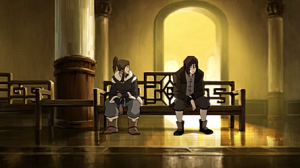
One of the great fears that modern adolescents share, as they enter adulthood, is the fear of losing some true part of themselves. This is why adolescents get so bitter and confrontational – they recognize the compromises and hypocrisies that adults have grown accustomed to, and they can’t stand it. Teenagers don’t want to compromise on their passions. They want to do what they want when they want it, and they can’t understand why anyone would want anything less.
(Teenagers also want to fit in with their peers, of course. The conflict between those two drives – fitting in and acting out – defines a lot of teenage drama)
The fear of losing one’s unique spark is a very adolescent fear. Adults tend to have either more prosaic fears – losing one’s job, losing one’s health, making an ass out of oneself at the Christmas party – or more profound ones, like what sort of legacy they’ll leave for their children. But they’re not as concerned with abandoning their inborn specialness. Maybe that’s because we’ve already lost that spark, but that’s a debate for another day.
You May Be Born With Privileges That You Don’t Recognize
When Korra visits Republic City, it’s her first time dealing with strangers in years. When she was discovered to be the Avatar, she was scooped up and dropped into an Order of the White Lotus compound. She spent the next dozen years being feted and trained by the greatest benders in the world. The crowds in Republic City are her first exposure to common people.
Things don’t go well for her at first.
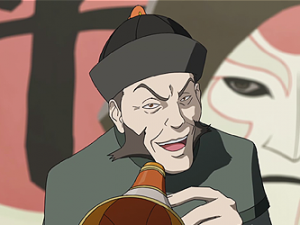
Equalist Agitator: Join Amon, and together we will tear down the bending establishment!As the Nick audience, we’re inclined to agree with Korra’s initial take – that bending is the coolest thing in the world. If bending is oppressive to non-bender citizens, we’re not going to see it. But whether or not it is oppressive, there’s clearly a sizable faction who feels as though it is. How sizable? Big enough to field an apparently limitless army of masked chi-blockers and pilot a flotilla of bomber zeppelins.
Korra: What are you talking about? Bending is the coolest thing in the world.
Equalist Agitator: Oh yeah? Let me guess – you’re a bender.
Korra: Yeah, I am.
Equalist Agitator: And I’ll bet you’d just love to knock me off this platform with some waterbending, huh?
Korra: I’m seriously thinking about it.
Equalist Agitator: This is what’s wrong with the city! Benders like this girl only use their power to oppress us!
(Crowd boos and yells at Korra)
Korra: What? I’m not oppressing anyone! You’re … you’re oppressing yourselves!
Equalist Agitator: That didn’t even make sense!
But most of the benders we see in LOK are benevolent, with a few exceptions like Tarrlok and Lightning Bolt Zolt. So where does this sense of being oppressed by benders come from? Are they making it all up? Ultimately, it doesn’t really matter. If enough people feel as if they’re being oppressed, they will act the way oppressed people do: grumbling, occasional angry backlashes, and an undercurrent of hostility that a demagogue can shape to his purposes. There’s no practical difference between an underclass that thinks it’s being oppressed and an underclass that is being oppressed – they’ll react the same way.
Unfortunately, because the source of that oppression is inherited through birth and feels pretty harmless, or even awesome, it’s going to be hard for the “bending class” to sympathize. And it’s going to be even harder for us, the Nick audience, to sympathize, since we tend to think bending is pretty awesome, too.
That’s the way privilege works.
The word “privilege” gets thrown around a lot in discussions of social and cultural power. Lots of commentators use it without defining it, deflecting ideological opponents and closing ranks. Telling someone with privilege to “check their privilege!” doesn’t make things any clearer for them. Of course, it’s not the job of subaltern classes to make themselves easier for the rest of us to understand. But the balance of power only ever shifts if those in power relinquish some of it, and doing that takes understanding.
So: privilege is the ability to ignore something if you don’t want to care about it.
Korra has a brief and frustrating dialogue with an Equalist agitator in E1, as outlined above. She blunders into his rhetorical trap, admitting that she can shut down his peaceful discussion anytime she wants by using her bending powers. Stymied when the crowd turns on her, she rides off. She spoke with an angry non-bender, tried to find out where he was coming from, then disengaged.
Korra, as a bender – as potentially the greatest bender in the world – doesn’t know what it’s like to be a non-bender. She can listen to non-benders, like the rabble-rouser in E1. She can even sympathize with them, as she does when breaking up a police action in E8. But she can stop caring about them and return to Air Temple Island any time she likes. It wouldn’t be a crime if she did; it wouldn’t even be unusual. And no one could say that Korra is a bad person.
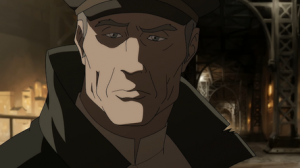
A non-bender, on the other hand, never gets to stop dealing with being a non-bender. They don’t get to set aside their non-bending concerns for a while if they get tired. They always have to worry if the Triple Threat Triad is going to pick on them this week (E1), or if they’re going to lose their shift at the power plant because a slumming firebender is going to zap the batteries (E3), or if the Council is going to pass some bizarre new edict that cracks down on all non-benders (E8). Their life may not be a constant misery. In fact, most of them probably live very good lives. But just as a person can’t take off their skin color or their gender, a non-bender can’t take off their non-bendingness. They can’t stop caring about what life is like as a non-bender, whereas a bender – even the most patient, saintly bender – can stop caring what life is like for non-benders at any time.
The biggest obstacle with privilege is that the people who are born with it don’t feel guilty about it. How can they? It’s something they were born into. It’s something they’ve been raised with since childhood. Korra has been surrounded by people telling her she was special and powerful her whole life. When someone tells her that she should be ashamed of that specialness and power, she gets defensive. Who wouldn’t? It’s like telling someone they should be ashamed of their face.
Of course, jokes about “white guilt” (chi guilt?) aside, people shoudn’t feel guilty about their privilege. The point of calling out privilege isn’t (or shouldn’t be) to shame people. It’s to get them to recognize the differences in personal experience that might make other people’s lives incomprehensible to them. A bender might not understand how a non-bender could feel oppressed by the generally benevolent bender population. Korra in particular wouldn’t understand it, having been immersed in bending culture and practice her entire life.
And yet it’s something she has to recognize. As a stranded civilian points out to her in E8, “you’re our Avatar too!” She’s the spiritual diplomat to the entire world, benders and non-benders alike. She has to step outside of the experience she was raised in and learn how other people feel, even if they have feelings she isn’t going to understand. The rest of us may get to live comfortably within the strata we were born into, but Korra is called to step outside her comfort zone.
One of the biggest things adolescents deal with as they leave home, going to college or entering the workforce for the first time, is exposure to people unlike themselves. Most adolescents are raised in a community that largely matches their home life: same socioeconomic status, limited racial diversity, same small set of religions. Going to a big university or entering an urban job market will blow their minds at how wide the world is. Some commentators would argue that the best response is to broaden your horizons and try to understand these strangers, while others say that sticking to one’s native cultural heritage is healthier. Either way, exposure to strangers is a hallmark of growing up.
Listening to the Spirits
Lots of children’s programming tells you to believe in yourself, work hard and respect others. But few shows, if any, give real shrift to how hard that is. The world throws a lot at you when you cross from adolescence into adulthood, and it doesn’t prepare you for most of it. Legend of Korra doesn’t have all the answers on how to live as a responsible adult in a modern society. But it lets you know that it’s hard, that it’s okay to look for help, and that the people who weather the storm are heroes.
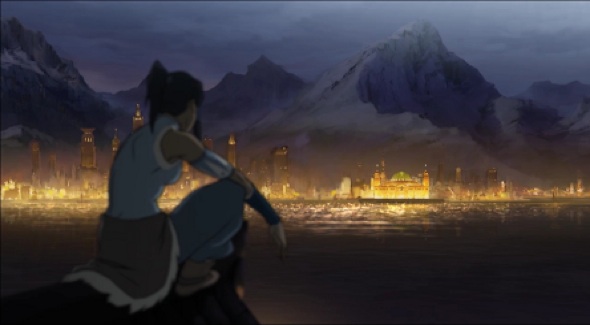
Related Posts
- [Think Tank] Legend of Korra: Platinumbending
- Episode 47: Men Are Coming To Destroy You
- The Five Ages of Hollywood
- Sexy Teenaged Werewolves In Love
Legend of Korra: Well I Guess This Is Growing Up originally appeared on Overthinking It, the site subjecting the popular culture to a level of scrutiny it probably doesn't deserve. [Latest Posts | Podcast (iTunes Link)]
No comments:
Post a Comment